Eiffage Bundle
Can Eiffage Continue Its Construction Dominance?
Eiffage, a European construction and concessions powerhouse, stands at the forefront of an industry undergoing rapid transformation. With infrastructure needs, technological advancements, and sustainability demands reshaping the landscape, understanding Eiffage's growth strategy is critical. Founded in 1992, the company has a rich history, merging expertise in civil engineering and construction.
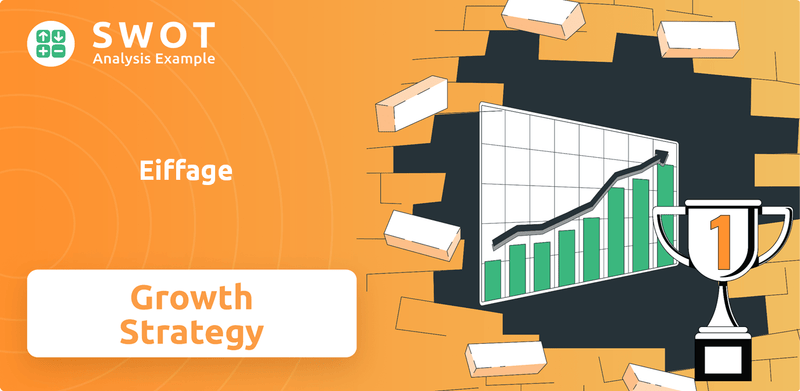
This Eiffage SWOT Analysis will examine the company's strategic initiatives, market position, and future prospects. From its roots in France, Eiffage has become a major international player, offering a diverse portfolio that includes building construction, real estate, and concessions. This analysis will dive into Eiffage's plans for expansion, innovation, and financial performance, offering insights into its trajectory and long-term goals.
How Is Eiffage Expanding Its Reach?
The Eiffage growth strategy is centered on a multifaceted expansion approach. This includes geographical diversification and an enhanced service offering. The company is actively pursuing projects in infrastructure concessions to secure long-term revenue streams. Eiffage also focuses on expanding its activities in the energy sector, particularly in renewable energies, to meet growing demand and diversify its revenue base.
A significant element of Eiffage's strategy involves integrating new business models. These models focus on sustainable urban development and smart infrastructure. The company aims to leverage its expertise in urban development to participate in large-scale regeneration projects. This contributes to the creation of sustainable cities and strengthens its market position. Eiffage's commitment to innovation and sustainability is evident in its project portfolio.
Eiffage is also strategically expanding its international footprint. The focus is on markets with high growth potential. The company aims to consolidate its European leadership while selectively pursuing opportunities abroad. This approach enhances its global reach and resilience. The company's strategic initiatives are designed to drive sustainable growth and increase shareholder value.
Eiffage is heavily involved in infrastructure concessions. These projects provide stable, long-term revenue streams. The A69 motorway project, with completion expected in 2025, is a key example. This highlights the company's commitment to expanding its concessions portfolio.
The company is expanding its energy sector activities. A major focus is on renewable energies to meet growing demand. The photovoltaic plant in Vassincourt, France, which began construction in early 2024, is a key initiative. This diversification strengthens Eiffage's revenue base.
Eiffage is integrating new business models focused on sustainable urban development. This includes smart infrastructure projects. The company leverages its expertise in urban development to participate in large-scale regeneration projects. This contributes to sustainable cities.
The company is focused on expanding its international footprint. Eiffage targets markets with high growth potential. The goal is to consolidate European leadership and selectively pursue opportunities abroad. This enhances its global reach and resilience.
Eiffage's growth strategy emphasizes infrastructure concessions and renewable energy. The company is also focused on sustainable urban development and international expansion. These initiatives are designed to drive long-term value and enhance its market position.
- Infrastructure Concessions: Focus on long-term, stable revenue streams.
- Renewable Energy: Expanding activities to meet growing demand.
- Sustainable Urban Development: Leveraging expertise in urban regeneration.
- International Expansion: Targeting high-growth markets.
Eiffage SWOT Analysis
- Complete SWOT Breakdown
- Fully Customizable
- Editable in Excel & Word
- Professional Formatting
- Investor-Ready Format
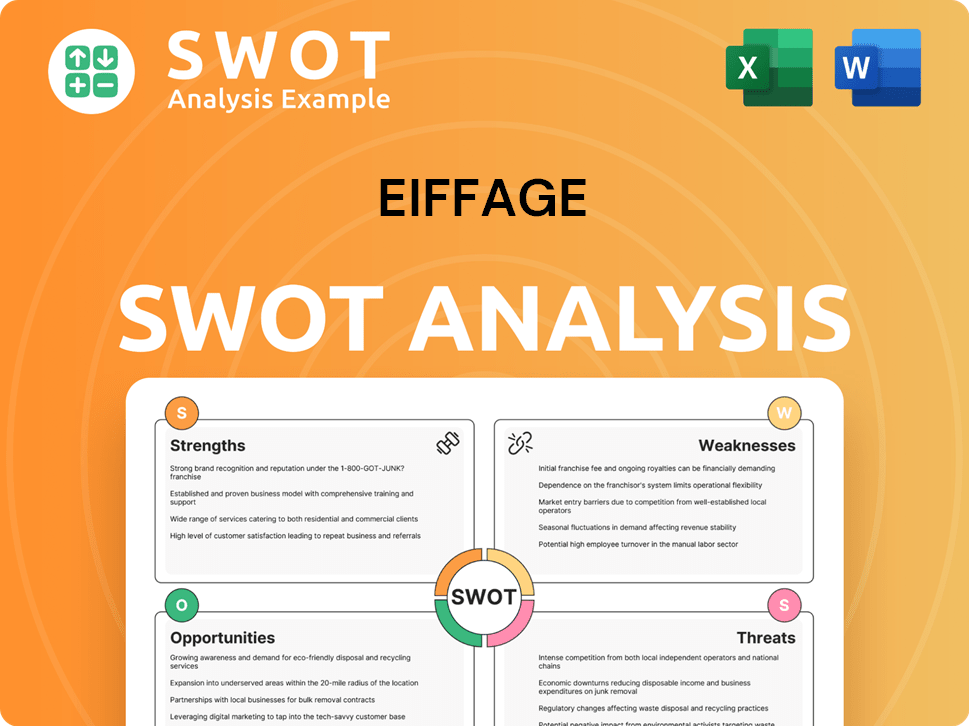
How Does Eiffage Invest in Innovation?
Eiffage's growth strategy heavily relies on innovation and technology to maintain its competitive edge and drive sustainable expansion. The company is deeply invested in digital transformation, automation, and the development of eco-friendly solutions, ensuring it stays at the forefront of industry advancements. This focus is crucial for meeting evolving market demands and enhancing operational efficiency.
The company's approach includes substantial investments in research and development, aimed at improving construction processes and creating new, value-added services. This commitment to innovation is a key driver of Eiffage's future prospects, enabling it to adapt to changing market conditions and maintain a strong market position. It's a core element of Eiffage's business model.
Eiffage's commitment to innovation is further demonstrated through its participation in collaborative research programs and partnerships with academic institutions. These initiatives aim to foster a culture of continuous improvement and technological advancement within the group, ensuring it remains at the forefront of the industry.
Eiffage is actively pursuing digital transformation across its operations. This includes implementing digital tools for real-time project progress tracking and enhancing team collaboration.
BIM is a key technology adopted by Eiffage, streamlining design, construction, and facility management. This leads to greater precision and reduced costs across projects.
The company is exploring the use of Artificial Intelligence (AI) and the Internet of Things (IoT) to optimize site management. This includes predicting maintenance needs and improving safety.
Eiffage is committed to developing low-carbon construction methods and materials. This aligns with environmental regulations and client demands for greener infrastructure.
Eiffage invests significantly in research and development to enhance construction processes. This includes developing innovative asphalt mixes that reduce energy consumption and CO2 emissions.
Eiffage participates in various collaborative research programs and partnerships with academic institutions. These initiatives aim to foster a culture of continuous improvement and technological advancement.
Eiffage's focus on innovation and technology is a critical component of its strategy for future growth, especially in the context of the evolving construction industry. For example, the integration of BIM has allowed Eiffage to improve project efficiency by up to 15%, according to internal reports from 2024. Furthermore, the company's investment in sustainable solutions aligns with the increasing demand for green infrastructure, with the global green building materials market projected to reach \$467.5 billion by 2028, as per a 2024 report by Grand View Research. The company’s commitment to innovation also helps it maintain a strong market position and navigate challenges such as rising material costs and labor shortages. For a deeper understanding of the competitive landscape, consider reading about the Competitors Landscape of Eiffage.
Eiffage's technological initiatives are designed to enhance efficiency, reduce costs, and promote sustainability. These efforts are central to the company's long-term goals and vision.
- Implementation of BIM across all projects.
- Use of AI and IoT for site management and predictive maintenance.
- Development of low-carbon construction methods and materials.
- Investment in R&D to improve processes and create new services.
Eiffage PESTLE Analysis
- Covers All 6 PESTLE Categories
- No Research Needed – Save Hours of Work
- Built by Experts, Trusted by Consultants
- Instant Download, Ready to Use
- 100% Editable, Fully Customizable
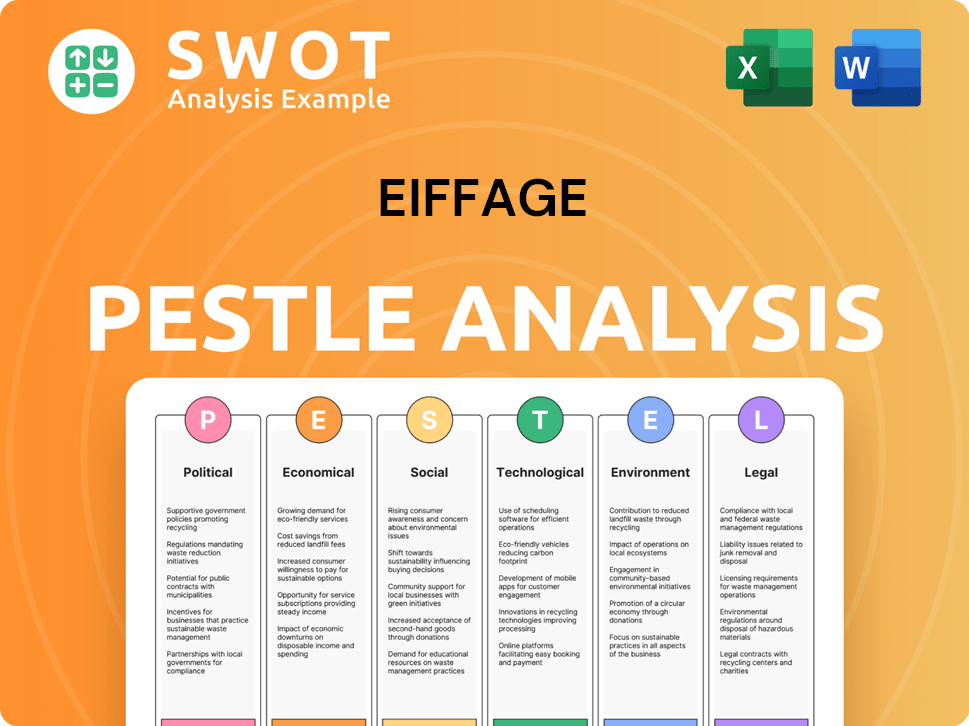
What Is Eiffage’s Growth Forecast?
The financial outlook for Eiffage remains positive, supported by a robust order book and strategic investments. The company's performance in 2023 showed strong growth, with revenue reaching €21.7 billion, a 9.2% increase compared to 2022. This positive trend is expected to continue into 2024, with projections indicating further revenue increases. The concessions segment is particularly anticipated to contribute significantly to earnings due to the stable cash flows from long-term contracts. This strong financial performance reflects the effectiveness of the Marketing Strategy of Eiffage.
Eiffage aims to maintain healthy profit margins by optimizing operational efficiency and leveraging its integrated business model. Investment levels are strategically allocated to support growth initiatives, including new concession projects and technological advancements. The company's financial strategy also emphasizes prudent capital management, focusing on maintaining a strong balance sheet to support future expansion and navigate potential economic fluctuations. Analyst forecasts generally align with the company's positive outlook, highlighting its resilient business model and strong market position.
The company's ability to secure new contracts and manage its project pipeline effectively will be crucial in achieving its long-term financial goals. The construction and concessions segments are expected to drive this growth, with the concessions segment providing a steady stream of revenue. Eiffage's focus on sustainability initiatives and digital transformation also plays a significant role in its financial strategy. The company's commitment to these areas is expected to attract further investment and support its long-term growth objectives.
In 2023, Eiffage reported a revenue of €21.7 billion, marking a 9.2% increase compared to the previous year. This strong performance highlights the effectiveness of Eiffage's business model and market position. The growth was driven by both the construction and concessions segments, indicating a diversified revenue stream.
Eiffage anticipates continued revenue growth in 2024, supported by its strong order book and strategic investments. The company's focus on operational efficiency and new projects is expected to contribute to this growth. The concessions segment is projected to maintain its strong contribution to earnings due to long-term contracts.
Eiffage strategically allocates investments to support its growth initiatives, including new concession projects and technological advancements. These investments are crucial for expanding the company's market share and driving long-term financial goals. The focus on innovation and sustainability also plays a key role.
Eiffage's financial strategy emphasizes prudent capital management, focusing on maintaining a strong balance sheet. This approach supports future expansion and helps navigate potential economic fluctuations. The company aims to maintain healthy profit margins through operational efficiency and its integrated business model.
Eiffage faces challenges related to project execution, economic fluctuations, and maintaining competitiveness. The company's ability to secure new contracts and manage its project pipeline effectively will be crucial. Eiffage's market position is strong, supported by its diversified business model and geographic presence.
- Focus on securing new contracts.
- Effective project management to ensure profitability.
- Adaptability to changing economic conditions.
- Commitment to sustainability and innovation.
Eiffage Business Model Canvas
- Complete 9-Block Business Model Canvas
- Effortlessly Communicate Your Business Strategy
- Investor-Ready BMC Format
- 100% Editable and Customizable
- Clear and Structured Layout
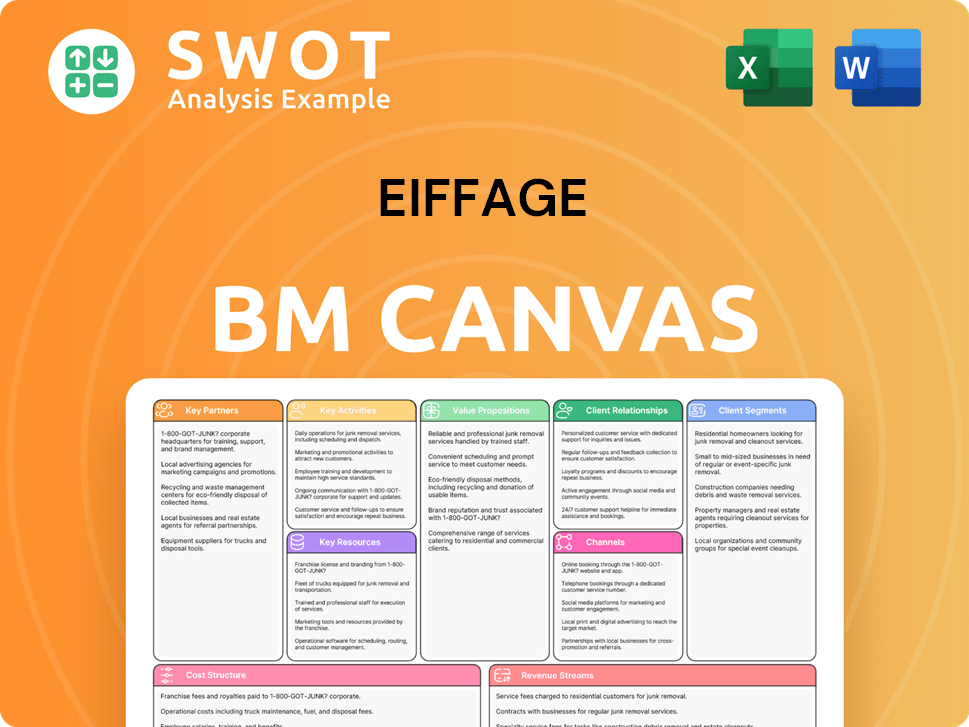
What Risks Could Slow Eiffage’s Growth?
The Eiffage growth strategy faces several potential risks and obstacles that could impact its future performance. These challenges include market competition, regulatory changes, supply chain vulnerabilities, technological disruptions, and internal resource constraints. Understanding these potential pitfalls is crucial for assessing the company's long-term sustainability and strategic agility.
Market competition remains a significant factor, with numerous established players vying for construction and concessions projects. Regulatory shifts, particularly concerning environmental standards and public procurement, could also influence project timelines and costs. Furthermore, supply chain disruptions and technological advancements pose continuous challenges that require proactive management.
Internal resource constraints, such as a shortage of skilled labor, could impede project execution and growth. The company employs comprehensive risk management frameworks to assess and prepare for these challenges. Recent examples of navigating obstacles include adapting to post-pandemic supply chain disruptions and managing inflationary pressures on raw materials and energy costs, demonstrating the company's resilience in a challenging economic landscape.
The construction and concessions markets are highly competitive, with numerous established firms. This competition can lead to pressure on margins and the need for continuous innovation to secure projects. The company faces rivals across Europe and internationally, necessitating strong competitive advantages.
Changes in environmental regulations and public procurement rules can significantly affect project timelines and costs. Stricter emissions standards may require additional investments in sustainable technologies. Compliance with evolving regulations is crucial for maintaining project viability and avoiding penalties.
Geopolitical events and global economic shifts can exacerbate supply chain vulnerabilities, leading to material shortages and price volatility. The company mitigates this risk through diversified sourcing and strategic partnerships. Managing these vulnerabilities is critical for project delivery and profitability.
The rapid adoption of new construction methods and digital tools by competitors poses a risk if the company fails to adapt quickly. Continuous investment in R&D and fostering a culture of innovation are essential. Staying ahead of technological advancements is key to maintaining a competitive edge.
A shortage of skilled labor can impede project execution and growth. Investing in training programs and attracting talent is crucial for mitigating this risk. Effective workforce management is essential for ensuring project success and meeting future demands.
The company employs comprehensive risk management frameworks, including scenario planning and diversification across business segments and geographies. Adapting to post-pandemic supply chain disruptions and managing inflationary pressures demonstrates resilience. These strategies are vital for long-term stability.
Eiffage's market position is influenced by its ability to navigate these challenges. The company's financial performance and Eiffage's business model are directly impacted by its success in managing these risks. For example, in 2024, the company reported revenues of approximately €21 billion, with a strong order book. Further details can be found in this article about the company's strategic initiatives: Eiffage's growth strategy.
Eiffage's future prospects in renewable energy are promising, but also subject to risks. The company's expansion into this sector is part of its long-term growth strategy. The success of these ventures depends on factors such as government policies, technological advancements, and market demand. Strategic investments in renewable energy projects are key to diversification.
Eiffage Porter's Five Forces Analysis
- Covers All 5 Competitive Forces in Detail
- Structured for Consultants, Students, and Founders
- 100% Editable in Microsoft Word & Excel
- Instant Digital Download – Use Immediately
- Compatible with Mac & PC – Fully Unlocked
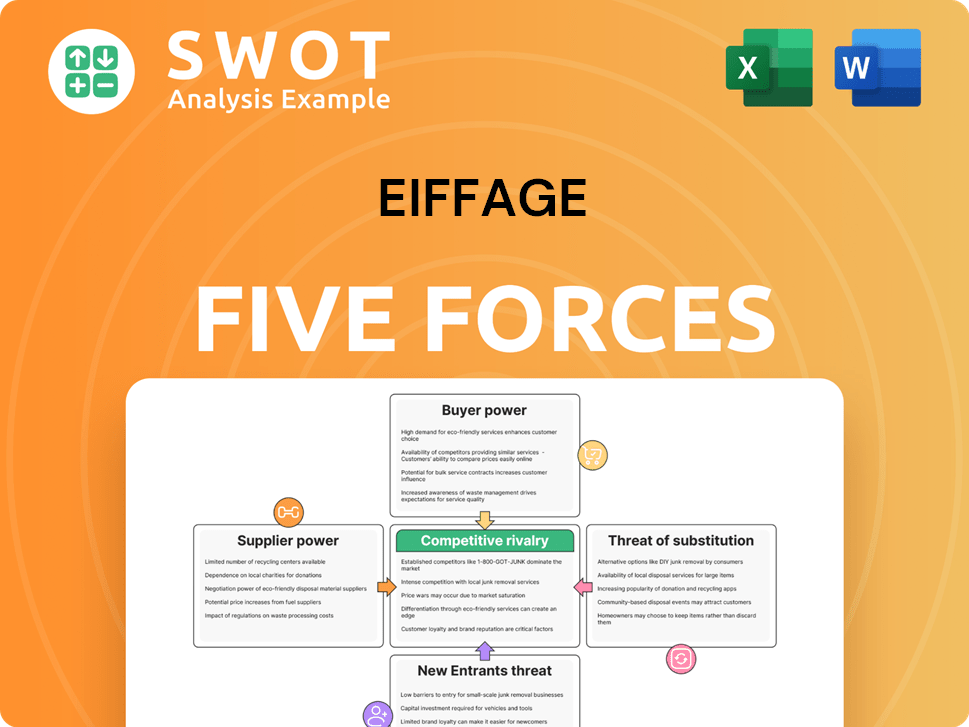
Related Blogs
- What are Mission Vision & Core Values of Eiffage Company?
- What is Competitive Landscape of Eiffage Company?
- How Does Eiffage Company Work?
- What is Sales and Marketing Strategy of Eiffage Company?
- What is Brief History of Eiffage Company?
- Who Owns Eiffage Company?
- What is Customer Demographics and Target Market of Eiffage Company?
Disclaimer
All information, articles, and product details provided on this website are for general informational and educational purposes only. We do not claim any ownership over, nor do we intend to infringe upon, any trademarks, copyrights, logos, brand names, or other intellectual property mentioned or depicted on this site. Such intellectual property remains the property of its respective owners, and any references here are made solely for identification or informational purposes, without implying any affiliation, endorsement, or partnership.
We make no representations or warranties, express or implied, regarding the accuracy, completeness, or suitability of any content or products presented. Nothing on this website should be construed as legal, tax, investment, financial, medical, or other professional advice. In addition, no part of this site—including articles or product references—constitutes a solicitation, recommendation, endorsement, advertisement, or offer to buy or sell any securities, franchises, or other financial instruments, particularly in jurisdictions where such activity would be unlawful.
All content is of a general nature and may not address the specific circumstances of any individual or entity. It is not a substitute for professional advice or services. Any actions you take based on the information provided here are strictly at your own risk. You accept full responsibility for any decisions or outcomes arising from your use of this website and agree to release us from any liability in connection with your use of, or reliance upon, the content or products found herein.